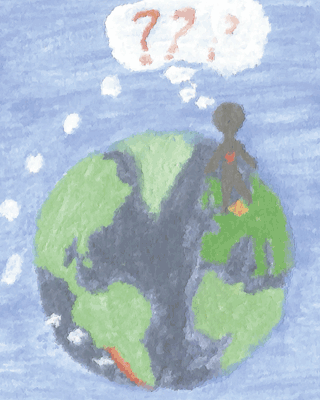Iran, Turkey, Haiti, Chile. Seemingly faraway disasters and civil unrest are often local tragedies for TU Delft international students. A Chilean student on the quake back home and the aftershocks in Delft.
For a Chilean PhD student, life in Delft is usually as regular as that of any other international student. And so it was, until a month ago when a massive earthquake and subsequent tsunamis hit Chile. That horrible day – 27 February – of deeply intense worry about my family back home was an experience I wish on no one.
Yet in some sense normal life in Chile has always been related to natural disasters. The long piece of land that is my country stretches along a fault line between the Nazca plate and the South America plate, which every fifty years or so produces a big shake or earthquake.
Chile then is a country in which past natural disasters are part of our collective memory. Chileans grow up experiencing small shakes nearly every year – nothing to worry about, just something normal. But this time of course it was different. Not only the first massive earthquake to occur in my lifetime, but a tragedy that hit Chile while I was living abroad. Thousands of kilometres from home, all I could do was just watch helplessly.
But what, for international students in Delft, is the anatomy of a disaster at home? Disaster day starts at 8 a.m. with text messages from Chilean friends relating the bad news. Then the desperate search for news starts. Chilean news broadcasts via internet, CNN, Dutch TV, while frantically trying to connect to family via Skype. An entire day passes without a word from my family. Are they alive? More news watching and hopeless waiting. An emotional roller-coaster ride of worry, fear, impotency and finally relief, for me, communication with one of my brothers. By the end of that fateful day I finally hear that all my family is safe.
This is part one, the opening act. But what comes next, post-disaster day, is equally distressing, the restless stressful feeling of being abroad, of being powerless to help your family and fellow countrymen.
Days pass, more information appears. Total chaos at home. Massive structural damage, two million people left homeless, hundreds dead. Thousand of volunteers gather to help on the ground, but you, in your faraway land, in Delft, cannot be one of them. Instead, regular life goes on: your studies demand attention, deadlines and exams loom.
From here, it is impossible to imagine that areas where I travelled just a year ago are now completely destroyed. It’s impossible to imagine what friends, family and all victims of the earthquake were forced to live through, impossible to share in their collective grief. Helplessness, guilt, regret, these are emotions for the ‘lucky ones’ abroad.
Being here there is not much we can do. We send emails and tell friends and associates how they can help, where they can donate. We hold fundraising events and even write articles like this one. It’s something, but you continue to live with the feeling that you want to, that you must do something more.
Poll
Natural disasters, wars, civil unrest. When tragic events strike countries around the world, should the university have a policy in place for providing special assistance (psychological counselling, special academic/exam support and relief, etc) to the TU Delft international students from the affected countries? Let us know your opinion briefly for publication on Delta’s letters page (please include your name, study and country of origin). Reply to: d.mcmullin@tudelft.nl
Ruim veertig procent van de Turks-Nederlandse studenten zat ooit op het vmbo. Via de havo of het mbo bereikten ze alsnog het hoger onderwijs, maar de stapelroute mag niet de enige zijn, zeggen onderzoekers van het Amsterdamse Instituut voor migratie- en etnische studies (Imes). Door de late start op de basisschool en de vroege selectie in groep acht, krijgen Nederlandse leerlingen van Turkse afkomst relatief weinig tijd om een leerachterstand weg te werken. (HOP)



Comments are closed.